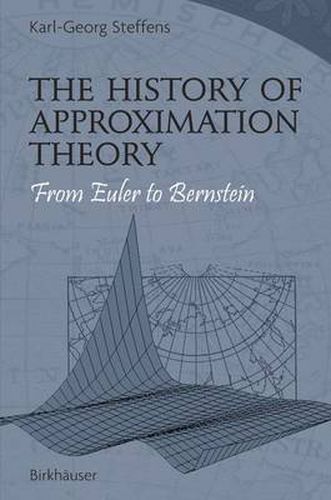Readings Newsletter
Become a Readings Member to make your shopping experience even easier.
Sign in or sign up for free!
You’re not far away from qualifying for FREE standard shipping within Australia
You’ve qualified for FREE standard shipping within Australia
The cart is loading…






This title is printed to order. This book may have been self-published. If so, we cannot guarantee the quality of the content. In the main most books will have gone through the editing process however some may not. We therefore suggest that you be aware of this before ordering this book. If in doubt check either the author or publisher’s details as we are unable to accept any returns unless they are faulty. Please contact us if you have any questions.
The problem of approximating a given quantity is one of the oldest challenges faced by mathematicians. Its increasing importance in contemporary mathematics has created an entirely new area known as Approximation Theory. The modern theory was initially developed along two divergent schools of thought: the Eastern or Russian group, employing almost exclusively algebraic methods, was headed by Chebyshev together with his coterie at the Saint Petersburg Mathematical School, while the Western mathematicians, adopting a more analytical approach, included Weierstrass, Hilbert, Klein, and others.This work traces the history of approximation theory from Leonhard Euler’s cartographic investigations at the end of the 18th century to the early 20th century contributions of Sergei Bernstein in defining a new branch of function theory. One of the key strengths of this book is the narrative itself. The author combines a mathematical analysis of the subject with an engaging discussion of the differing philosophical underpinnings in approach as demonstrated by the various mathematicians. This exciting exposition integrates history, philosophy, and mathematics. While demonstrating excellent technical control of the underlying mathematics, the work is focused on essential results for the development of the theory. The exposition begins with a history of the forerunners of modern approximation theory, i.e., Euler, Laplace, and Fourier. The treatment then shifts to Chebyshev, his overall philosophy of mathematics, and the Saint Petersburg Mathematical School, stressing in particular the roles played by Zolotarev and the Markov brothers. A philosophical dialectic then unfolds, contrasting East vs. West, detailing the work of Weierstrass’ as well as the Goettingen school led by Hilbert and Klein. The final chapter emphasizes the important work of the Russian Jewish mathematician Sergei Bernstein, whose constructive proof of the Weierstrass theorem and extension of Chebyshev’s work serve to unify East and West in their approaches to approximation theory.Appendices containing biographical data on numerous eminent mathematicians, explanations of Russian nomenclature and academic degrees, and an excellent index round out the presentation.
$9.00 standard shipping within Australia
FREE standard shipping within Australia for orders over $100.00
Express & International shipping calculated at checkout
This title is printed to order. This book may have been self-published. If so, we cannot guarantee the quality of the content. In the main most books will have gone through the editing process however some may not. We therefore suggest that you be aware of this before ordering this book. If in doubt check either the author or publisher’s details as we are unable to accept any returns unless they are faulty. Please contact us if you have any questions.
The problem of approximating a given quantity is one of the oldest challenges faced by mathematicians. Its increasing importance in contemporary mathematics has created an entirely new area known as Approximation Theory. The modern theory was initially developed along two divergent schools of thought: the Eastern or Russian group, employing almost exclusively algebraic methods, was headed by Chebyshev together with his coterie at the Saint Petersburg Mathematical School, while the Western mathematicians, adopting a more analytical approach, included Weierstrass, Hilbert, Klein, and others.This work traces the history of approximation theory from Leonhard Euler’s cartographic investigations at the end of the 18th century to the early 20th century contributions of Sergei Bernstein in defining a new branch of function theory. One of the key strengths of this book is the narrative itself. The author combines a mathematical analysis of the subject with an engaging discussion of the differing philosophical underpinnings in approach as demonstrated by the various mathematicians. This exciting exposition integrates history, philosophy, and mathematics. While demonstrating excellent technical control of the underlying mathematics, the work is focused on essential results for the development of the theory. The exposition begins with a history of the forerunners of modern approximation theory, i.e., Euler, Laplace, and Fourier. The treatment then shifts to Chebyshev, his overall philosophy of mathematics, and the Saint Petersburg Mathematical School, stressing in particular the roles played by Zolotarev and the Markov brothers. A philosophical dialectic then unfolds, contrasting East vs. West, detailing the work of Weierstrass’ as well as the Goettingen school led by Hilbert and Klein. The final chapter emphasizes the important work of the Russian Jewish mathematician Sergei Bernstein, whose constructive proof of the Weierstrass theorem and extension of Chebyshev’s work serve to unify East and West in their approaches to approximation theory.Appendices containing biographical data on numerous eminent mathematicians, explanations of Russian nomenclature and academic degrees, and an excellent index round out the presentation.